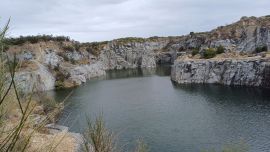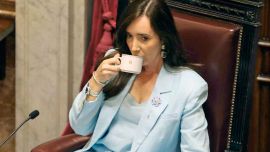The Supreme Court’s explosive ruling, confirming Cristina Fernández de Kirchner’s conviction for corruption, six-year prison sentence and lifelong ban from public office raises many questions.
Here’s an attempt to provide some answers and explore the impact of the decision:
House arrest
Argentina’s Judiciary has granted five working days for Fernández de Kirchner to formally present herself before the courts for processing, a deadline which falls next Wednesday, as Monday is a public holiday.
“We have a five-day period for her to appear at the Comodoro Py [federal] courthouse complex and, in the meantime, the request for house arrest is under review, which the tribunal must rule on before that date,” said her lawyer Carlos Beraldi.
The law allows for house arrest to be granted to individuals over 70 convicted of common crimes.
The 72-year-old former president has requested she serve her sentence at her flat in the Constitución neighbourhood, a few minutes from the National Congress and close to her daughter Florencia’s residence.
She also has a registered address in Río Gallegos, 2,600 km south of Buenos Aires in Santa Cruz Province.
She has further asked to be exempted from wearing an electronic ankle tag, given the ongoing protection she has as a result since an assassination attempt on September 1, 2022.
“In the unlikely event that these requests are not granted... we reserve the right to appeal to the Supreme Court of Justice of the Nation and to the relevant international human rights bodies,” her defence team stated.
Political ban
The two-term ex-president (2007–2011 and 2011–2015) and former vice-president (2019–2023) currently leads the Partido Justicialista (PJ) and remains the main opposition leader.
Just days ago, Fernández de Kirchner had announced her candidacy for provincial deputy in the Buenos Aires Province legislative elections set for September – a post that carries parliamentary immunity.
However, the Supreme Court’s ruling imposes a permanent political disqualification, which may also require her to step down as national chair of the PJ.
“Wherever I am, I’ll keep speaking out,” Fernández de Kirchner vowed to supporters on Tuesday.
“She’ll remain the undisputed leader, and the next steps will be taken from her home,” said Peronist leader Felipe Solá, a former governor of Buenos Aires Province.
Pardon?
Although the Executive Branch has the power to pardon her, there is no indication that this is being considered.
“This was never discussed,” Cabinet Chief Guillermo Francos said on Wednesday. “Milei has been very clear – he can use the presidential power to pardon in specific cases, but not for someone convicted of corruption against the Argentine state.”
The closest precedent was the series of pardons issued by former president Carlos Menem (1989–1999) to military officials convicted of crimes against humanity during the 1976-1983 military dictatorship. These were later overturned as unconstitutional.
Public reaction
Hundreds continue to gather outside Fernández de Kirchner’s home to show their support.
Three major trade union federations demonstrated “against the political ban and in defence of democracy” and some labour leaders have called for a general strike.
On Tuesday, several unions blocked roads into the capital. That night, a group of demonstrators also broke into the building housing the TN television channel – which was critical of Fernández de Kirchner during her presidency – and vandalised its entrance. One person was arrested. The Association of Journalistic Entities (ADEPA) called for “an urgent investigation” into the attack.
On Wednesday, university students began peaceful occupations at several campuses, and a new rally was expected later in the day by pensioners protesting in front of Congress for higher payments – a weekly event.
Protests over Fernández de Kirchner’s conviction are converging with wider social unrest, including demonstrations by students, scientists, and healthcare workers over government budget cuts.
“They can lock me up, but people are earning miserable wages,” the ex-president said to her supporters on Tuesday.
A vigil outside the Supreme Court took place Thursday night as supporters continue to voice their anger.
Elections
“Everyone was expecting Cristina to stand as a candidate, but she’s now banned from running, disqualified, so Peronism needs to figure out how to restructure. We’re just spectators at this point,” offered Cabinet Chief Guillermo Francos this week.
Fernández de Kirchner was set to stand in the Buenos Aires Province local elections. Argentina’s most populous province is governed by Peronist leader Axel Kicillof, who has brought the vote forward instead of pairing it with the national legislative elections scheduled for October.
“If there was any chance the early vote in Buenos Aires [Province] wouldn’t be nationalised, this changes everything – it makes it entirely a national issue,” political analyst Carlos Fara told AFP.
Furthermore, Milei “loses a political rival who was very useful to him.”
Nevertheless, according to Fara, Fernández de Kirchner “going to prison doesn’t mean people will stop voting for Kirchnerism.”
related news
by Sonia Avalos, AFP


























Comments